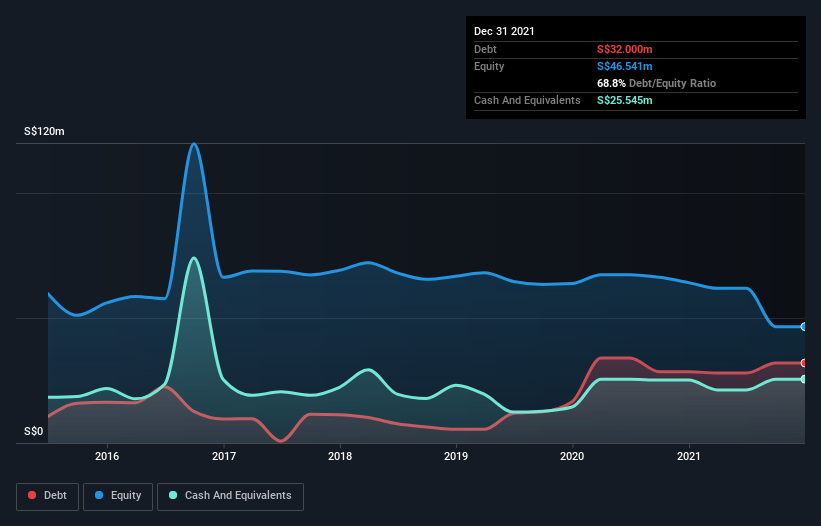Legendary fund manager Li Lu (who Charlie Munger backed) once said, 'The biggest investment risk is not the volatility of prices, but whether you will suffer a permanent loss of capital.' When we think about how risky a company is, we always like to look at its use of debt, since debt overload can lead to ruin. Importantly, Nera Telecommunications Ltd (SGX:N01) does carry debt. But is this debt a concern to shareholders?
What Risk Does Debt Bring?
Generally speaking, debt only becomes a real problem when a company can't easily pay it off, either by raising capital or with its own cash flow. Part and parcel of capitalism is the process of 'creative destruction' where failed businesses are mercilessly liquidated by their bankers. While that is not too common, we often do see indebted companies permanently diluting shareholders because lenders force them to raise capital at a distressed price. Of course, debt can be an important tool in businesses, particularly capital heavy businesses. When we examine debt levels, we first consider both cash and debt levels, together.
View our latest analysis for Nera Telecommunications
What Is Nera Telecommunications's Net Debt?
You can click the graphic below for the historical numbers, but it shows that as of December 2021 Nera Telecommunications had S$32.0m of debt, an increase on S$28.5m, over one year. However, because it has a cash reserve of S$25.5m, its net debt is less, at about S$6.46m.

How Strong Is Nera Telecommunications' Balance Sheet?
According to the last reported balance sheet, Nera Telecommunications had liabilities of S$104.6m due within 12 months, and liabilities of S$843.0k due beyond 12 months. Offsetting these obligations, it had cash of S$25.5m as well as receivables valued at S$85.6m due within 12 months. So it actually has S$5.69m more liquid assets than total liabilities.
This short term liquidity is a sign that Nera Telecommunications could probably pay off its debt with ease, as its balance sheet is far from stretched. There's no doubt that we learn most about debt from the balance sheet. But you can't view debt in total isolation; since Nera Telecommunications will need earnings to service that debt. So if you're keen to discover more about its earnings, it might be worth checking out this graph of its long term earnings trend.
Over 12 months, Nera Telecommunications made a loss at the EBIT level, and saw its revenue drop to S$103m, which is a fall of 22%. To be frank that doesn't bode well.
Caveat Emptor
Not only did Nera Telecommunications's revenue slip over the last twelve months, but it also produced negative earnings before interest and tax (EBIT). Its EBIT loss was a whopping S$14m. On a more positive note, the company does have liquid assets, so it has a bit of time to improve its operations before the debt becomes an acute problem. But a profit would do more to inspire us to research the business more closely. So it seems too risky for our taste. The balance sheet is clearly the area to focus on when you are analysing debt. But ultimately, every company can contain risks that exist outside of the balance sheet. For example Nera Telecommunications has 3 warning signs (and 1 which doesn't sit too well with us) we think you should know about.
If, after all that, you're more interested in a fast growing company with a rock-solid balance sheet, then check out our list of net cash growth stocks without delay.
Valuation is complex, but we're here to simplify it.
Discover if Nera Telecommunications might be undervalued or overvalued with our detailed analysis, featuring fair value estimates, potential risks, dividends, insider trades, and its financial condition.
Access Free AnalysisHave feedback on this article? Concerned about the content? Get in touch with us directly. Alternatively, email editorial-team (at) simplywallst.com.
This article by Simply Wall St is general in nature. We provide commentary based on historical data and analyst forecasts only using an unbiased methodology and our articles are not intended to be financial advice. It does not constitute a recommendation to buy or sell any stock, and does not take account of your objectives, or your financial situation. We aim to bring you long-term focused analysis driven by fundamental data. Note that our analysis may not factor in the latest price-sensitive company announcements or qualitative material. Simply Wall St has no position in any stocks mentioned.
About SGX:N01
Nera Telecommunications
Designs, engineers, distributes, sells, services, installs, and maintains telecommunication systems and products in transmission networks and satellite communications and information technology networks.
Excellent balance sheet and slightly overvalued.
Similar Companies
Market Insights
Community Narratives



